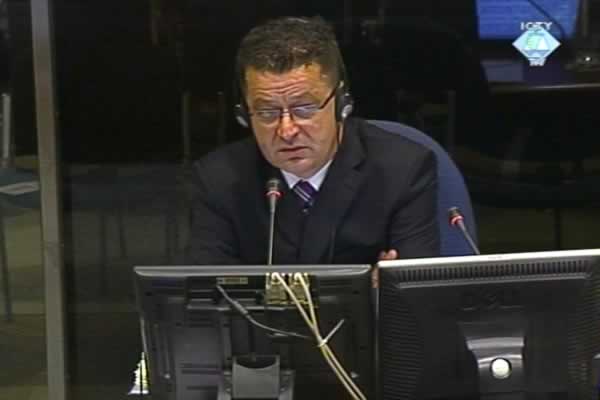Home
‘COMPLEX CIRCUMSTANCES’ IN HVO CAMPS
Martin Raguz, member of the BH parliament, describes the conditions in the notorious camps Dretelj and Gabela in Capljina during the Croatian-Muslim conflict in 1993 as ‘complex circumstances’
 Martin Raguz, defense witness for Jadranko Prlic
Martin Raguz, defense witness for Jadranko Prlic In his testimony in the defense of the former Herceg Bosna prime minister Jadranko Prlic, Martin Raguz, member of the BH parliament, described the conditions in the camps in Capljina during the Croat-Muslim conflict in 1993 as ‘complex circumstances’. According to the evidence of the former captives of the Dretelj and Gabela camp, hunger, torture and beatings were merely part of everyday abuse they were submitted to.
In his cross-examination by the prosecution, the witness confirmed that he was informed about the conditions in the Capljina prisons at a meeting of the HVO in July 1993 after he was appointed the deputy head of the Office for Refugees and Displaced Persons in Herceg Bosna. In his words, the Herceg Bosna authorities then showed they had a ‘responsible attitude in that situation’ when they ordered the transfer of prisoners to Ljubuski where a transition center was opened.
Prosecutor Douglas Stringer put it to the witness that the HVO used transition centers for systematic moving out of the Muslim population from Capljina, Ljubuski, Stolac and other Herzegovina towns. Among them were prisoners detained in those camps and members of their families. As alleged by the prosecution, the Office for Refugees and Displaced Persons participated in the ethnic cleansing of Muslims. The Office collected applications and secured visas for their departure. The witness however claims that the transition centers were there to ‘help people’ who wanted to leave ‘to a better and safer place’ than the Dretelj camp, as the witness put it.
The witness strenuously rejected the prosecution argument that the HVO hade a policy to move the Muslims from Herzegovina in 1993 in order to make room for the Croats from Central Bosnia. Instead of the terms ‘ethnic cleansing’ and ‘moving out’ used by the prosecutor, the witness preferred to talk of ‘relocation of population’. In his view, this relocation should be considered within the context of the overall situation in BH during the war.
The witness was particularly sensitive to the prosecutor’s questions about Stolac; this is his birthplace. According to the 1991 census, 40% of the population was Muslim. He insisted that he had left town a long time ago and that there was nothing for him in Stolac during the war. When the prosecutor asked him to clarify why by the end of the summer of 1993 there were no Muslims in town, the witness evaded answering the question, noting that Serbs expelled both Muslims and Croats from Stolac when the war broke out.
Linked Reports
- Case : Prlic et al.
- 2008-08-26 MEMORABLE SOLIDARITY OR ETHNIC CLEANSING
- 2008-08-25 RAGUZ: WOMEN AND CHILDREN WERE USED FOR POLITICAL ENDS IN SARAJEVO
- 2008-07-22 PRESIDENT’S MAN
- 2008-09-16 DEFENSE: HERCEG BOSNA WAS NOT 'CROATIZED'
- 2008-09-18 URBICIDE OR 'CONSEQUENCE OF THE CONFLICT'
- 2008-09-22 ‘COMMIE’ AND EXPERT
